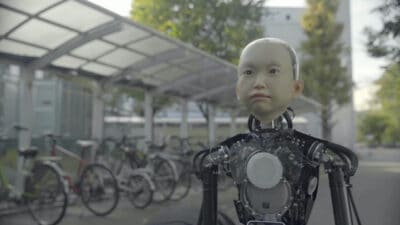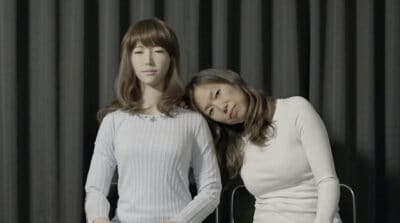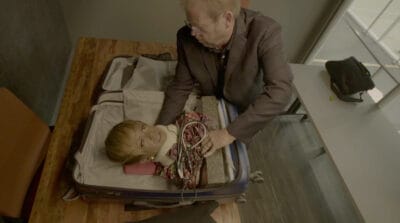As soon as I saw the trailer for Ann Shin’s documentary A.rtificial I.mmortality, I turned to my partner and said, “Oh, you’re going to love this.”
Of the two of us, he’s the sci-fi nerd, who gets a thrill from the wonders of technology. He likes to take apart computers and rebuild them, and actively hunts down freaky stories about robots taking over the world, or whatever. But I’m happy to report that I loved it too. The science and gadgets are impressive, but this is a human story that explores our drive, our desires, our fears, and asks tough questions about who we are, and what is our essence? Can we be duplicated with artificial intelligence, and if so, what does that mean? Shin’s doc gave us chills and had us sitting up late at night, chatting about the film long after it ended.
Ann is a local Toronto filmmaker who lives in the Christie Pits neighbourhood (I discovered this after I noticed Fiesta Farms, her local grocery store, retweeting our A.rtificial I.mmortality tweets), so it’s extra cool that her film is opening Hot Docs this year. Like so many documentary filmmakers, Ann’s film is a result of her ravenous curiosity. “I was concerned by the developments of AI,” she tells me over a Zoom call, “We’re distracted by the gadgets, like a shiny new car, and we’re not thinking about where we are heading, what’s the horizon.”

Smart watches tell us how many steps we’ve taken, algorithms feed us exactly what we want, Google can identify photos of us taken over a decade ago—things are already freakier than we could have imagined. We know what’s happening on Facebook….what’s going on in the AI labs? What is that technology now capable of?
Most people feed their curiosity with a quick online search, or maybe drop a question into the universe on social media. Ann, however, travels the world and continues to ask questions to get real answers. What she discovers is magnificent, but also unnerving.
“AI technology is leading us to a place where AI doesn’t just outthink humans, it can emote, it can have intuition,” says Ann, who discovered that AI was being created to allow humans to live forever (well, sort of). On her journeys, to labs in Japan, America, and right here in Toronto at Ryerson University, Ann met with AI avatars, sat with them, conversed with them—including an AI clone of herself.
In the process of making her film, Ann’s father developed Dementia. “When it got to the point where he couldn’t remember my mother I was gobsmacked and heartbroken…because my father was the storyteller in our family and that’s where I get the storytelling impulse from,” Ann shares, admitting that his illness compelled her to dig deeper. “For him to lose his stories was like losing an essential part of him and it made me wonder what is it that makes us us? What is essential to who we are?”

One of the scientist’s Ann interviewed, Dr. Hussein Ramadam, explains intuition as an aggregate of our experiences, our memories, that come together in a moment, and lead to a snap judgement. “If you feed all that information into a computer, into an AI system, the AI system can have intuitive responses to a situation as well,” says Ann, who was startled by that concept. “When you think about it, in the age of AI, our data is our body and our minds.”
Given that, how replaceable are we? If we can build an avatar that doesn’t just know our stories, but can think like us, respond like us, and look like us, are we able to live beyond our death? Would our loved ones be fulfilled chatting with an AI version of ourselves, would our avatar provide comfort? Hold our memories better than we ever could? These are unsettling questions.
In the film there is a scene where Ann is introduced to digital Deepak Chopra. In a boardroom, she engages in a conversation, not with the actual Deepak Chopra, but with the robotic bust that looks like him. “He was so emotive…it was like a real conversation. I was surprised at my own impulse to see that software program, this AI system, as being human. It made me understand how quickly and how far we’ve come to accepting AI and thinking about AI as human. Particularly after this year, in the pandemic, we’ve all been living our lives online, that we’re even more prone to doing that now.”

A.rtificial I.mmortality will induce shivers, a mix of excitement and fear, but even Ann, after all she has witnessed and learned, is hopeful that the technology has the potential to advance us, and not overtake us. “I would say that I have cautious optimism,” she says, with a nervous laugh. “One of the things I hope the film will do, is help people look to the horizon so that we don’t create a future that we’re going to complain about. Technology is part of our lives, but we can choose how to develop it. We have to be mindful, and speak up. We can’t just let companies dictate.”
A.rtificial I.mmortality will open the 2021 Hot Docs Festival and will include a Live Q&A – Thursday, April 29, 7:30 PM with a special guest like no other. Get tickets here.




 Follow Us On Instagram
Follow Us On Instagram
